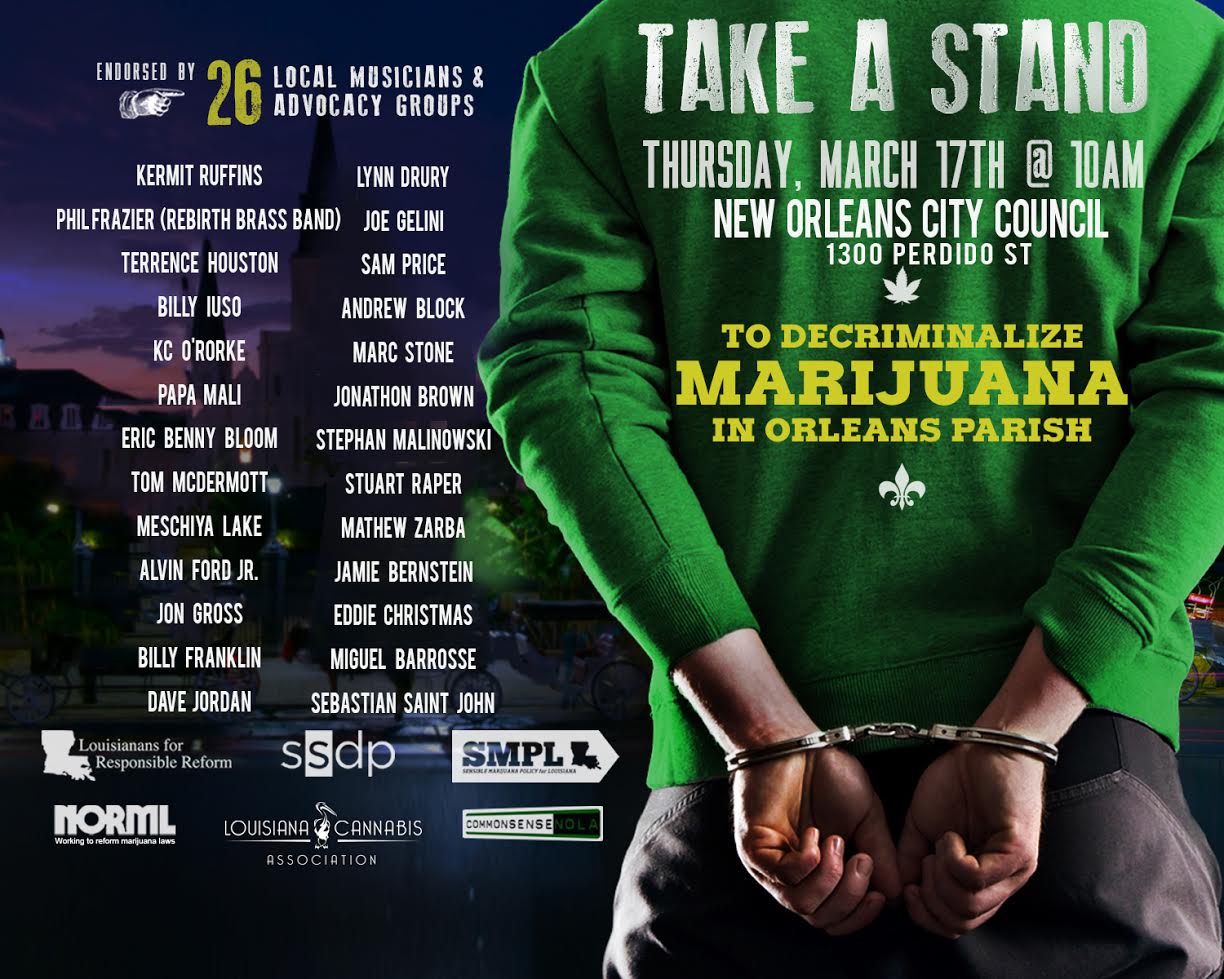A number of New Orleans musicians have joined forces to endorse the city’s proposed marijuana decriminalization ordinance. Kermit Ruffins, Phil Frazier (Rebirth Brass Band), Terrence Houston, Billy Iuso, KC O’Rorke (Flow Tribe), Papa Mali, Eric “Benny” Bloom, Tom McDermott, Meschiya Lake and many others have declared their support for the bill, which would reduce the penalty for simple marijuana possession to a fine ($40 for the first offense, $60 for the second, $80 for the third and $100 for subsequent offenses).
The New Orleans City Council plans to vote on the law—officially known as Ordinance 31,148—during tomorrow’s session.
“By passing this measure, the New Orleans City Council will take a huge step forward in reforming the criminal justice system’s marijuana sentencing,” O’Rorke said. “The music community has come together in a big way to lend our voice of support for Councilmember Susan Guidry’s proposed ordinance. It just makes sense.”
“My thing is that there’s thousands of families, if not more, living paycheck to paycheck,” Ruffins explained. “Especially young black families, which get targeted first. If they get pulled over, searched and marijuana is found in their possession, they can go to jail and have to pay legal fees, which will most likely add up to their monthly rent. Therefore they have to move out of their apartment and go live with their grandma or cousin or uncle. It takes a year to recover from having marijuana on them.”
If passed, the new ordinance would mark the city’s biggest shift in marijuana policy since Ordinance 28,246 went into effect in 2011. That law gave police officers the ability to issue a summons for first-time marijuana possession charges instead of forcing them to make custodial arrests. Since its implementation, New Orleans has seen its number of marijuana possession arrests drop to an average of 2,600 per year (between 2011 and 2014) from its previous high of 6,000 per year (2007-2010). However, officers still issued 1400 summonses per year between 2011 and 2014, bringing the total number of marijuana possession charges to 4,000 per year during that time frame.
While Ordinance 28,246 marked a step in the right direction, advocates of marijuana policy reform have argued that it doesn’t go far enough because it maintains criminal penalties for marijuana possession, allowing cops and courts to waste precious resources on something that shouldn’t be a priority.
“We support this new ordinance for a number of reasons, but the allocation of scarce police resources may be most important,” said Kevin Caldwell, executive director of CommonsenseNOLA, said. “Using an average of 6 hours per arrest means that, even with the current ordinance, 15,000 manpower hours are used every year enforcing marijuana possession laws. These are resources that most New Orleanians want used to battle violent crime. It also opens an opportunity for the police to begin reaching out to a community that has traditionally had an adversarial relationship with law enforcement.”
“It does not legalize marijuana in New Orleans, but makes the punishment fit the crime in the eyes of the vast majority of citizens,” Caldwell added. “We have tried to curb use by having some of the most draconian sentences in the country and that policy has been a failure. It has contributed to making Louisiana the prison capital of the world. It is time we change our paradigm when dealing with marijuana.”
Advocates have also pointed out that the current law needs to be changed because it has not stopped police and courts from aggressively prosecuting marijuana possession charges. An oft-cited case is that of Bernard Noble, a 49-year-old father of three who is currently serving a 13-year sentence for possessing two joints worth of pot. Noble was convicted in 2011, and New Orleans District Attorney Leon Cannizzaro’s office pursued the strictest possible sentence under Louisiana’s habitual offender laws. The D.A. appealed the case three times after two trial judges—Terry Alarcon and Franz Ziblich—sentenced him to just five years in jail, with one of those judges noting that Noble’s final 13-year sentence “will be a greater punishment for his children than for himself.” (A Change.org petition requesting clemency for Noble currently has over 68,000 signatures.)
Under the proposed ordinance, which goes up for a vote tomorrow, Noble might not have been charged with a crime under city law (though he still could have been charged under state law). Instead, he probably would have been hit with a fine of no more than $100.





